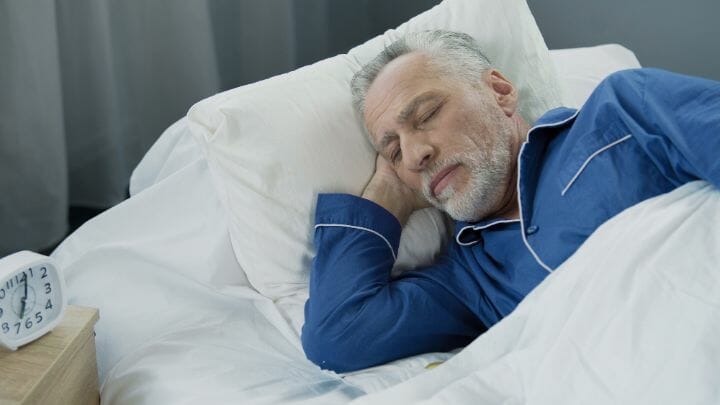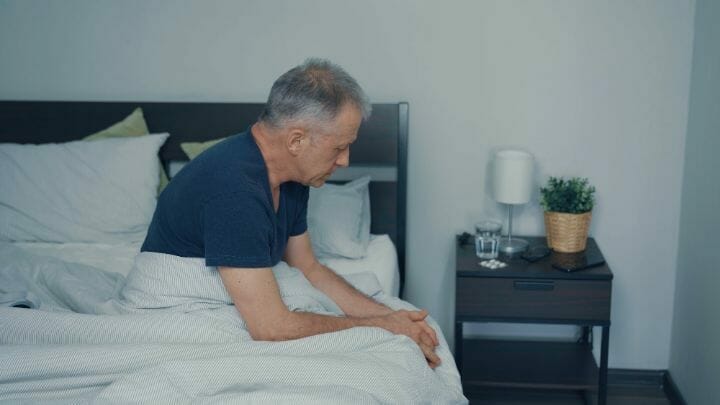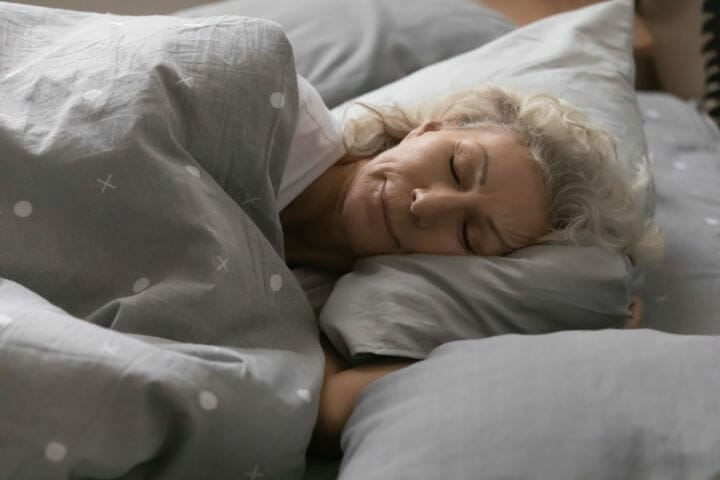Getting enough sleep is a crucial part of keeping ourselves healthy – especially as we age. Unfortunately, as we age, it can be harder to get a restful sleep at night, and we find that we’re waking up tired or can’t stay asleep for that long at a time.
Not getting enough sleep has been linked to having a higher risk of health conditions like diabetes, heart disease, and even obesity.
A good night’s sleep, on a consistent basis, does so much good for your body including improving your memory, creativity and even give you a boost in terms of your decision-making.
If you’re finding that you’re having difficulty getting a full night’s sleep, there are options to help you out. Some options require a prescription from your doctor and could have some unwanted side effects to them.
There are some other options, though, that are naturally occurring in our bodies, to help you fall asleep so you don’t have to worry about those side effects of sleeping pills.
Sometimes, these naturally occurring substances can diminish in terms of the amounts we have in our bodies – which can contribute to troubles with getting restful sleep.
You may need some help in falling asleep, staying asleep, or just getting good, restful sleep – and that’s ok. Here are a few things to consider, and some options, for better sleep as you age.
Contents
Establish Those Habits
Sometimes, even if you have great sleeping habits, you will find you need a little extra help getting a good night’s sleep but habits can go a long way.
After years of working, raising your family, and attending to the numerous other obligations you had, your sleep schedule and habits might have suffered a bit. If you can, start making sleep a priority for you, and work on the habits you have surrounding sleep.
If you can, try to go to bed and wake up at the same time each day – regardless of the day of the week. As you age, this might get easier to do as in retirement your schedule will often become much less busy very quickly.
This can be great for getting more sleep, but it can also cause your sleep schedule to go all over the place because you don’t have some commitments on your schedule.
Do your best to keep your sleeping schedule the same and it will help a lot in making sure you’re getting restful sleep.
Natural Sleep Aids
Many people don’t want to take prescription sleeping pills because they don’t like how they feel on them, and they aren’t ok with the potential side effects.
There are a number of natural sleep aids, though, that can help with your quality of sleep without the unwanted extras.
Melatonin
You’ve probably heard this name thrown around a bit as its benefits have become quite popular recently.
Melatonin occurs naturally in your body as it is a hormone that your body will produce on its own. Its function in the body is that it sends signals to your brain that it’s time to start shutting down and go to sleep.
The cycle that this hormone is produced on, and its subsequent release into your body, is dependent on the time of day.
Naturally, your melatonin levels will increase in the evening – when most people go to sleep – and will decrease in the morning when it’s time to start your day.
Knowing this, when your sleep cycle has been interrupted – for any reason – melatonin supplements have become increasing popular (among people of all ages).
What’s interesting is that studies have shown melatonin can increase sleep quality and duration – even during the daytime, which has made this supplement very popular among shift workers.
For the elderly, melatonin can help reduce the amount of time it takes to fall asleep and increase the total amount of sleep time. As an added benefit, since melatonin is naturally occurring in our bodies it’s safe for most people to take over an extended period of time.
If you have questions about whether melatonin is safe to take with the other medications, always reach out to your doctor to double-check.
You may also like How to Sleep With Lower Back Pain and Sciatica?
Valerian Root
While this root is common to Asia and Europe, it is known to be used as a natural treatment for anxiety, depression and even helping with the symptoms of menopause.
It is also one of the most commonly used natural herbal supplements for promoting healthy sleep. Many postmenopausal women have seen an improvement in their sleep quality when using valerian root.
Unlike melatonin, the use for valerian root may be best suited for short-term use for help with sleep quality.
Additionally, there may be some side effects to using it so you may also want to double-check with your doctor to make sure that it is safe to take with the other medications you use.
Magnesium
This mineral is naturally occurring in the body, including being involved in hundreds of processes the body performs every day – including being important for heart health and brain function.
Magnesium has been known to quiet the body, which may be why it’s associated with helping to fall asleep when you’re having trouble doing so.
The relaxing effect of magnesium may come from its ability to regulate your body’s production of melatonin. It is also known to relax your muscles, and therefore induce you into a sleep-like state.
Some studies done on magnesium levels in people have shown that a deficiency in magnesium could be linked to trouble sleeping and even insomnia.
Increasing the amount of magnesium in your body, through supplements, could help you with the quality and quantity of sleep you’re getting.
Overall, magnesium has a very calming and relaxing effect on the body which can help induce sleep and even improve the quality of sleep you do get.
Lavender
The scent of lavender has been known, for a while, to enhance sleep. Many studies have been done, and most show that even just smelling lavender before going to sleep can be enough to improve the quality of your sleep that night.
For people with dementia, it has been shown that lavender aromatherapy is helpful for improving the sleep disturbances that often come with dementia.
It is important to note that lavender aromatherapy is intended for external use only and is meant for you to smell only. You should not ingest lavender essential oils as they have been known to cause nausea and even severe stomach pains if ingested.
You may also like to read about the best wearable sleep tracker
Passionflower
This has been known as a herbal remedy for sleep troubles and insomnia. The passionflower’s sleep-promoting effects, although the benefits may depend on the form it is consumed in.
Those who took a passionflower extract, rather than drinking it in tea form, said they saw significant improvement in their sleep quality.
As you can guess, passionflower is not as common as melatonin for being used as a natural sleep aid, so there may be some more studies needed to prove its efficacy.
However, it is a natural supplement that has been shown beneficial in improving sleep quality for those who are having trouble falling and staying asleep.
Glycine
Glycine is an amino acid that is important to our nervous system, so it is naturally occurring in our bodies.
While the science behind exactly why it works is still a little unknown, it is thought that this amino acid acts by lowering the temperature of your body which can signal to your brain it’s time to start going to bed.
These supplements have also been known to help people who take them fall asleep faster. This supplement can be taken in pill form or as a powder that dissolves into the water.
You can also increase the amount of glycine in your diet by increasing the amount of food you consume that is higher in glycine. This includes animal products (like meat, eggs, bone broth), beans, spinach, kale, cabbage, and even bananas and kiwis.
If you are going to look into taking glycine supplements, they are found to be most effective when taken immediately before bedtime.
You may also like Benefits of Sleeping in the Afternoon for the Elderly
Sleep Masks and Light Therapy Lamps
Lighting plays a very important role while sleeping. While they are not exactly natural aids, sleep masks and light therapy lamps really help regulate lighting when you sleep.
Sleep masks are particularly handy when you are traveling. They can also help if your partner likes more light than you when you sleep. We have seen people use sleep masks because of natural light streaming through their windows at dawn.
Similarly, light therapy lamps provide the right ambient lighting for sleep. Research has shown that exposing yourself to the right ambient light a few hours before your sleep time results in longer and more restful sleep.
Wrap Up
Getting enough quality sleep is imperative for healthy brain function and making sure you are as healthy as possible, but that can be difficult when you can’t fall asleep or stay asleep for long.
Some people can fall asleep easily but aren’t able to stay asleep long enough to get quality sleep. They often wake up feeling exhausted even with a long night’s sleep.
Other people can lay in bed for hours without falling asleep or even feeling tired. The natural supplements listed here are natural, so you don’t have to worry about the side effects, and they can help you fall asleep easily.
If you have questions about these supplements, even though they are naturally occurring, you should make an appointment with your doctor to discuss adding them to your regular routine.
It’s important to note that you should only try one supplement at a time to see what the effect of one of them is before trying something else.




